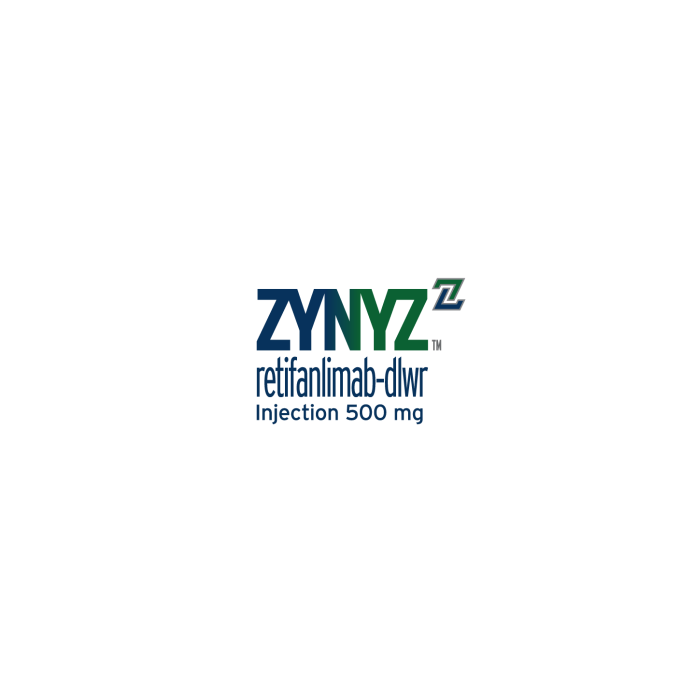Retifanlimab for renal cell carcinoma (and other types of cancer)
Last updated: 26 March 2024

You can legally access new medicines, even if they are not approved in your country.
Learn howIn 2023, Zynyz (retifanlimab) joined the ranks of FDA-approved immune checkpoint inhibitors. And just like other recently approved inhibitors, it's being researched for its potential use across various types of cancer, beyond its indication.
Can retifanlimab be used in renal cell carcinoma, breast cancer, and other conditions? With multiple clinical trials ongoing, it can be hard to understand the medicine's potential. Here, we'll look at the lates clinical trial data on retifanlimab. And we'll try to shed some light on its future role in cancer treatment.
What is retifanlimab approved for?
The FDA granted Zynyz (retifanlimab) an accelerated approval for the treatment of metastatic or recurrent locally advanced Merkel cell carcinoma (MCC) in adult patients 1.
An accelerated approval is based on the (preliminary) clinical trial data available at the time. In order for retifanlimab to get a full approval, more data will be required to verify the medicine's efficacy.
Retifanlimab and renal cell carcinoma: What we know
Retifanlimab is not approved anywhere for the treatment of renal cell carcinoma. However, ongoing clinical trials, such as the Phase 2 POD1UM-203 trial, are showing some promising initial results. More specifically:
-
23.5% of patients with renal cell carcinoma (RCC) responded to the treatment. In other words, their tumor either shrank or disappeared;
-
64.7% of RCC patients either responded to the treatment or had a stable disease;
-
The median duration of response was not reached. In other words, for some patients, the response to the treatment was ongoing. Therefore, the median duration couldn't be calculated because it had not yet been surpassed by half of the patients in the study. This is often a positive indication for a treatment, in terms of maintaining responses over a longer period;
-
The median progression-free survival for RCC patients was 5.4 months 2.
More research is needed to better understand the potential role of retifanlimab in renal cell carcinoma treatment. However, the POD1UM-203 trial outcomes are encouraging further investigation.
Can retifanlimab treat breast cancer?
Retifanlimab is not approved anywhere for the treatment of breast cancer. Multiple clinical trials are in process. Hopefully, they will soon provide more insights into the medicine's potential for this indication.
One of the avenues explored by research is a combination of retifanlimab with other immunotherapies. Here are some early trial results.
Bria-IMT together with retifanlimab for metastatic breast cancer
The ongoing NCT03328026 trial looks at Bria-IMT together with retifanlimab in treating metastatic or locally recurrent breast cancer. Bria-IMT is a targeted immunotherapy, while retifanlimab is an immune checkpoint inhibitor. This combination is designed to enhance the body's immune response against cancer cells. Particularly in patients with advanced metastatic breast cancer.
Some of the reported results include:
-
64% of patients responded to the treatment or had a stable disease;
-
The median progression-free survival was 3.5 months;
-
Patients reportedly experienced less pain and better quality of life 3.
The study will conclude at the end of June 2024. The final report will hopefully shed some more light on retifanlimab as a part of breast cancer treatment.
Pelareorep together with retifanlimab for metastatic triple negative breast cancer
The ongoing IRENE study is focusing on a combination of retifanlimab and pelareorep for the treatment of metastatic triple negative breast cancer.
The study's basis is that pelareorep will prepare the tumor microenvironment, leading to improved tumor response to the PD-1 inhibitor retifanlimab 4.
IRENE is expected to conclude in September 2024. Hopefully, its results will provide more encouragement for the potential of retifanlimab in breast cancer treatment.
Can retifanlimab be used for urothelial carcinoma (UC)?
Zynyz (retifanlimab) is not currently approved for treating urotherlial carcinoma. However, we do have some data from the POD1UM-203 trial to provide initial insights on its efficacy. Here are the main reported trial results relevant to UC patients:
-
37.9% of UC patients had their tumors shrink or disappear;
-
55.2% of UC patients either responded to the treatment or had a stable disease;
-
The median duration of response was 11.5 months;
-
The median progression-free survival was 5.7 months;
-
The median overall survival was 15.2 months 5.
Another trial focusing on retifanlimab for urothelial carcinoma is the phase 2 Optimus trial. It concluded in January 2024 6. As the results become available, hopefully they will bring positive news for UC patients everywhere.
Can retifanlimab treat lung cancer?
Retifanlimab has no authorization yet for the treatment of lung cancer. Based on available data from the POD1UM-023 trial, this is what we know about the medicine's success rate in NSCLC:
-
34.8% of NSCLC patients either had their tumors shrink or disappear;
-
65.2% of NSCLC patients either responded to treatment or had a stable disease;
-
The median duration of response was 18.2 months;
-
The median progression-free survival was 4.4 months;
-
The median overall survival was 21.9 months 5.
In addition to the POD1UM-203 trial, there's also an ongoing phase 3 trial (POD1UM-304) that looks at retifanlimab together with chemo as a first-line therapy for metastatic NSCLC. The expected completion date is in mid-2025 7.
What other cancers can retifanlimab treat?
Zynyz is showing potential in a variety of other treatment areas. Including metastatic squamous cell carcinoma of the anal canal (SCAC), (HER2)-positive metastatic gastric and gastroesophageal adenocarcinoma (GEA), and more 8,9.
More data are needed to provide evidence to the efficacy and safety of retifanlimab for any additional indication. However, one thing is certain - the medicine is of high interest for treating doctors and researchers alike. Hopefully, it will also be available in Europe soon.
Is Zynyz not approved or available in your country? If you and your doctor are of the opinion that this treatment might potentially benefit you, get in touch with our team of medicine access experts. We can give you personalized support for buying the medicine right now.
References:
- FDA grants accelerated approval to retifanlimab-dlwr for metastatic or recurrent locally advanced merkel. FDA, 22 March 2023.
- Phase 2 study of retifanlimab (INCMGA00012) in patients (pts) with selected solid tumors (POD1UM-203). Journal of Clinical Oncology, May 28 2021.
- Bria-IMT Plus Retifanlimab Continues to Show Early Clinical Benefit in Advanced Metastatic Breast Cancer. OncLive, 23 February 2023.
- INCMGA00012 and Pelareorep for the Treatment of Metastatic Triple Negative Breast Cancer, IRENE Study. ClinicalTrials.gov, Accessed 26 March, 2024.
- A Study of INCMGA00012 in Participants With Selected Solid Tumors (POD1UM-203). ClinicalTrials.gov, Accessed 26 March 2024.
- Randomized phase 2 umbrella study of various neoadjuvant therapies for patients with muscle-invasive urothelial carcinoma of the bladder (MIBC) who are cisplatin-ineligible or refuse cisplatin therapy and undergoing radical cystectomy (Optimus). Journal of Clinical Oncology, 16 February 2022.
- Platinum-Based Chemotherapy With/Without INCMGA00012, an Anti-PD-1 Antibody, in Non-Small Cell Lung Cancer (POD1UM-304). ClinicalTrials.gov, Accessed 26 March 2024.
- FDA Grants Priority Review for Retifanlimab for Advanced Squamous Cell Carcinoma of the Anal Canal. Targeted Oncology, 22 January 2021.
- Margetuximab with retifanlimab as first-line therapy in HER2+/PD-L1+ unresectable or metastatic gastroesophageal adenocarcinoma: MAHOGANY cohort A. NCBI, 24 August 2022.





